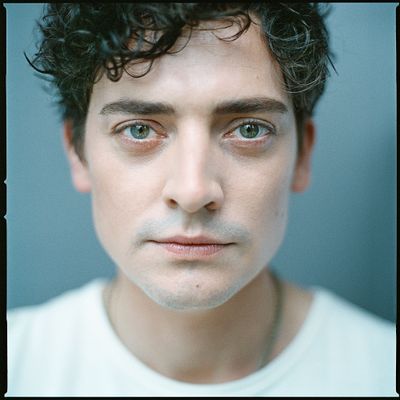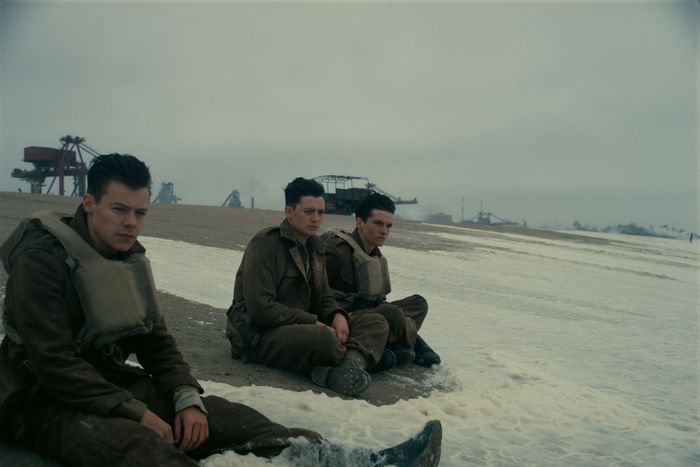
Before meeting Aneurin Barnard, it occurs to me that I have no idea what his actual voice sounds like. In Dunkirk, the 32-year-old actor played a French guy who was pretending to be an English guy, which necessitated a mostly silent performance. In Starz’s The White Queen, he played Richard III with an arch tone we might call Period-Piece Pronunciation. Now, in The Goldfinch, Barnard plays Boris, a shady Ukrainian globetrotter who reconnects with Ansel Elgort’s Theo many years after their youthful misadventures in Las Vegas. It’s a performance full of big choices, so it’s all the more surprising that in real life Barnard turns out to be a soft-spoken, slightly self-effacing Welshman. He proceeds through his sentences carefully, in seven- or eight-word bursts, and after a decade in the business, his voice retains the musical lilt of the Valleys. Listening to him talk feels a bit like being cradled in a soft woolen blanket.
We’re both in Toronto for The Goldfinch’s premiere at TIFF, where its Oscar hopes will die a quick, painless death. But as luck would have it, John Crowley’s critically savaged drama is just one of three films Barnard has at this year’s festival. Besides Boris, the actor also pops up as smug posho James Steerforth in Armando Ianucci’s David Copperfield adaptation, and as tightly strung physicist Paul Langevin in Marjane Satrapi’s Marie Curie biopic, Radioactive. (The latter premiered to a fairly muted reaction, but people at TIFF seemed to like Copperfield.) It’s a lot of worldly Europeans, a thrilling transformation for a kid from “the middle of nowhere, an old coal-mining valley where the coal mines have been closed since the 1980s.” Unlike many British actors, Barnard has working-class roots; his father was a miner and his mother worked in a factory. What is it like to play all these buttoned-up aristocrats? “It’s good fun,” he says, smiling. “You have to find the human being, within all the seriousness.”
As this interview is taking place in a world where there is still optimism around The Goldfinch, the plan is to do a short Q&A at the city’s famed Ben McNally Books, where Donna Tartt’s novel is prominently on display, then peruse the shelves to see if anything strikes our fancy. This is a better idea in theory than in practice, where it mostly results in the two of us wandering quietly around the shop and occasionally remarking on a title. “What to Wear When Surviving a Lion Attack?” Barnard says, noticing one slim volume. “Probably something very comfortable that you want to die in.” He flips through it. “I think it’s full of poems.” (It is.)
Barnard calls himself “an overthinker” when it comes to books: “I don’t want to invest so much time in a bad book.” He was an undiagnosed dyslexic as a child and preferred to watch movies, where he was entranced by those hell-raising old actors: Richard Burton, Richard Harris, Oliver Reed, Peter O’ Toole. When it does come time to crack open a book now he prefers nonfiction, especially big “provocative” books like Yuval Noah Harari’s Sapiens, which his wife is reading, or anything that makes him “question reality.” Biographies are a special favorite, as they’re full of “stuff I steal to use in characters.” He particularly enjoyed Patti Smith’s Just Kids, and always finds himself rereading Burton’s diaries.
Just like Burton, Barnard says he never wants to play the same kind of role twice. In the three projects premiering at TIFF, he got the chance to work with three very different directors. “John is very good at understanding emotional baggage, and discovering it just enough for the audience to feel like they get it, and then he takes it away,” he says. “Armando, with his own body language, is able to make you improvise the line that he was looking for, and he hasn’t said a thing. Marjane’s mind is like a grandfather clock: There’s all these ideas moving, and everything has to work with precision. Many of us probably wouldn’t be able to understand it, but the product that you see is bang-on time.”
We pass through the History section, which Barnard jokes that he has plenty of experience with. In person the actor has a gentleness to him, but on film his face takes on a gloomy, angular quality; one of the lessons he learned in drama school was how to harness what he calls his “darkness.” Add in the fact that he has the hair, eyes, and cheekbones of a Romantic poet, and it means that Barnard has spent a significant portion of his career brooding in historical dress. He was a ’70s dreamboat in Hunky Dory, a dissolute Darnley in a 2013 Mary Queen of Scots, and in the role that gave him his breakout, a wild-eyed Melchior in the West End production of Spring Awakening. “I don’t believe that we’re any different now than we were 400 years ago,” he says. “We show emotions in different ways; that’s the exciting thing about different periods. But the relationships between people, the manipulation between people, it’s always been the same.” Still, there are definite benefits to projects like The Goldfinch that are set in the present. “When you’re filming for 15 hours a day and you’ve got leather, chainmail, and plate armor on, sometimes you just want to wear some sweatpants and a vest.”
One of those historical projects was the BBC’s War and Peace, where Barnard played the shameless striver Boris Drubetskoy. (“My first Boris.”) In the shop, a book with a photo of Tolstoy on the cover catches his interest. He picks it up and reads the summary: vlogger … obscure amateur web series. “That’s nowhere near Tolstoy,” he mutters. It appears we’ve accidentally wandered into the YA section. We escape into Business, which might be even worse; of Bitcoin Billionaires, he notes, “That would be a book would probably make me fall asleep.” It’s around here that we give up the pretense of shopping for books.
At the beginning of our interview, I asked Barnard about Wales. You have to start, he said, with “the huge amount of passionate people who live there, who are incredibly charismatic and loyal to the bone. Most of them work very, very hard for very little in return, and that creates a very strong affiliation between people and community.” Like a lot of people who’ve left those kinds of communities and found their way into elite spaces, he has a nagging fear that he’ll soon be unmasked as an imposter: “Somebody’s gonna find out that I’m a fraud or a fake, or say, ‘By the way, you’ve not deserved any of this.’” It’s an uncomfortable feeling, but he reckons that it’s better than the alternative. “The moment I think that I’m the best that I can be is probably the day I should give up. ’Cause my ego’s obviously taken a turn for the worse.”






